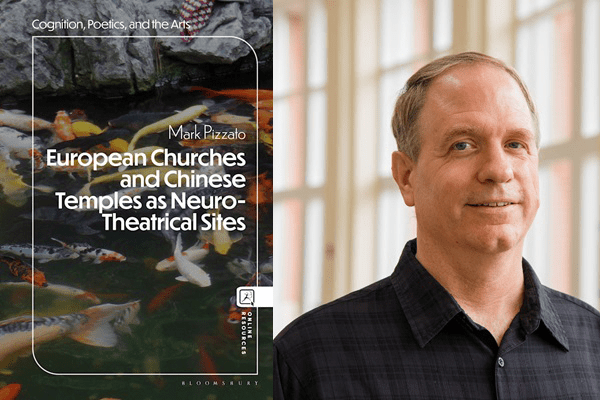Professor’s New Book Brings a Theatrical Perspective to the Study of Churches and Temples

Bloomsbury Publishing has today released European Churches and Chinese Temples as Neuro-Theatrical Sites, a new book by Professor of Theatre and Film Mark Pizzato. It is his eighth book.
Drawing from his extensive research and travel in Europe, China, and the Holy Land, Pizzato examines more than 80 religious buildings, with a wealth of visual material; in addition to the 40 images printed in his book, some 2,000 photos and videos will be available to anyone on an open-access platform on Bloomsbury’s website. As with earlier publications, he applies a theatrical perspective as he considers the design of those spaces, the ideas and practices they represent, and the responses, experiences, and behaviors that they evoke. His performance studies approach integrates theatre with such diverse disciplines as architecture, religion, philosophy, history, and a range of sciences – cognitive, affective, social, and neurological.
“A theatre perspective offers how different disciplines might interrelate in a holistic way,” he said.
In comparing European churches and Chinese temples, Pizzato said he was particularly struck by the element of melodrama so often present in the appearance and experience of Christian churches.
“In Europe, there’s a stronger tradition of emphasizing good over evil, heroes versus villains, depictions of martyrs, revenge, man over nature. In China there’s more emphasis on balance.”
It has led him to contemplate “the problem of melodrama and politics today,” he said, “the appeal and the dangers.” This summer he will travel to London, where he will deliver a presentation, “Melodramatic or Tragicomic Assemblages in European Church Rivalries,” at the Performance Studies international conference in June and continue research for a “sequel” to the current volume.
On Friday, May 3, at 2:00 pm, Pizzato hosted a Zoom book launch event that included a presentation, followed by dialogue with Bill Chu (Buddhism scholar) and Rob Conkie (Shakespeare scholar). Watch the recording of that event here.